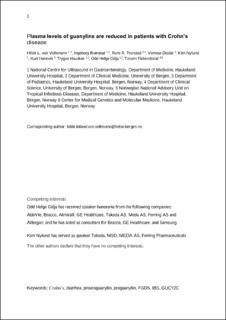Plasma levels of guanylins are reduced in patients with Crohn’s disease
Volkmann, Hilde Løland Von; Brønstad, Ingeborg; Tronstad, Rune Rose; Dizdar, Vernesa; Nylund, Kim; Hanevik, Kurt; Hausken, Trygve; Gilja, Odd Helge; Fiskerstrand, Torunn
Journal article, Peer reviewed
Accepted version
Permanent lenke
https://hdl.handle.net/11250/2755499Utgivelsesdato
2020Metadata
Vis full innførselSamlinger
- Department of Clinical Medicine [2065]
- Registrations from Cristin [9766]
Originalversjon
Scandinavian Journal of Gastroenterology. 2020, 55 (4), 449–453. 10.1080/00365521.2020.1748224Sammendrag
Background: Guanylin (GN) and uroguanylin (UGN) are endogenous ligands for the intestinal receptor guanylate cyclase C (GC-C), an important regulator of intestinal fluid homeostasis. Gene expression and protein levels of GN are suppressed in inflamed intestinal tissue from patients with inflammatory bowel disease (IBD), but knowledge about plasma levels of guanylins in these conditions is sparse. We aimed to investigate the fasting plasma levels of the prohormones proGN and proUGN in patients with Crohn’s Disease (CD) and relate these to levels found in persons with other diarrheal conditions, as well as persons with normal bowel habits.
Methods: Plasma from patients with CD, patients with Familial GUCY2C Diarrheal Disease (FGDS), diarrhea-predominant irritable bowel syndrome (IBS-D) and healthy controls (HC) was analyzed using ELISA assays.
Results: Significantly lower fasting plasma levels of proguanylins were found in CD and FGDS patients, compared to HC. In CD patients, plasma proGN levels correlated negatively with Harvey Bradshaw Index and with number of stools/24 h.
Conclusion: Our data indicate that diarrhea may be a determinant for levels of proGN in plasma, and should be further explored in studies of different diarrheal disorders.
